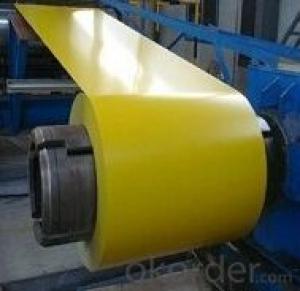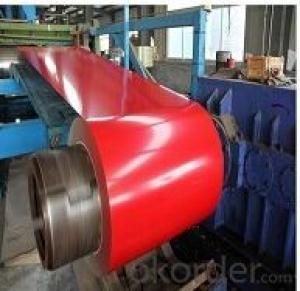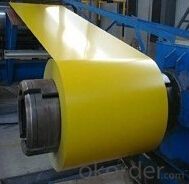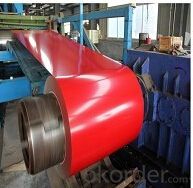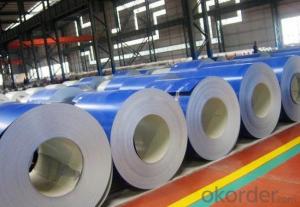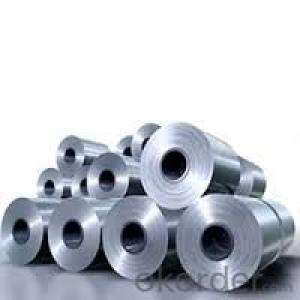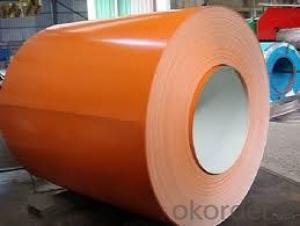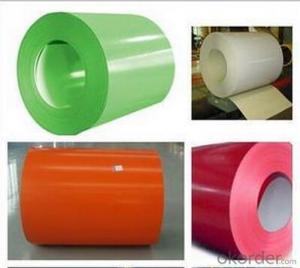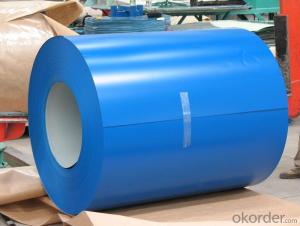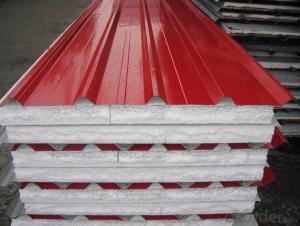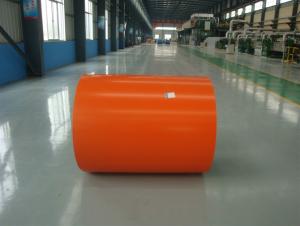Color Coated Steel Coil/Prepainted Steel Coil
- Loading Port:
- Tianjin
- Payment Terms:
- TT OR LC
- Min Order Qty:
- 25 m.t.
- Supply Capability:
- 10000 m.t./month
OKorder Service Pledge
OKorder Financial Service
You Might Also Like
Basic description Info.
Model NO.:cgcc
Surface Treatment:Coated
Certification:ISO
Technique:Hot Rolled
Standard:ASTM, JIS, GB, AISI
Width:600-1250mm
Thickness:0.13-1.0mm
Zinc Coating:Based on Customer′s Requirement
Top Side Painting:15-20mm
Back Side Painting:5-7micron
Color:Ral Color
Export Markets:Global
Additional Info.
Packing:Export High Accurucy Packing
Standard:iso
PPGI:
1, Introduction: Color coated steel coils(sheets), i. E. PPGI, also called prepainted steel coils(sheets), are made of galvanized steel coils(sheets) with polymer coatings as surface. It's a new enclosure material and building board with characteristics of light-weighted, heat preserved&insulated, easily installed with bright colors.
2, Production Process: Pretreatment(Degreasing)_Drying_Chromating_Paint Basic Oil_Cooling_Drying_Color Coating_Cooling_Film-covering_Rolling Up
3, Characteristics:
Good at corrosion resistence. Besides zinc coating of the basic plate of galvanized steel sheet, the color coating as the surface has double lifetime to ensure better anticorrosion effect.
With excellent cold bending molded manufacturablity, PPGI products can be processed or directly used as final product. As being light-weighted and conveniently transported, they're widly used to replace wood to save energy.
There're thousands of colors can be chosen as per different application. Any color plays well in decoration.
No pollution with high recycling rate, PPGI coils and sheets are strongly recommended as enviroment-friendly products by the government.
4, Appliance: Thanks to the above characteristics, color coated steel coils and sheets are widly used in construction, furniture industry, transportation industry, ect.
5, eye bands and 4 circumferential bands in steel, galvanized metal fluted rings on inner and outer edges, galvanized.
| commodity | Color Coated Steel Coil (PPGI/ PPGL) |
| Techinical Standard: | JIS G3302-1998, EN10142/10137, ASTM A755 |
| grade | TSGCC, TDX51D / TDX52D / TS250, 280GD |
| Types: | For general / drawing use |
| Base metal | galvanized, galvalume, cold rolled steel |
| Thickness | 0.14-1.0mm(0.16-0.8mm is the most advantage thickness) |
| Width | 610/724/820/914/1000/1200/1219/1220/1250mm |
| Type of coating: | PE, SMP, PVDF |
| Zinc coating | Z60-150g/m2 or AZ40-100g/m2 |
| Top painting: | 5 mic. Primer + 15 mc. R. M. P. |
| Back painting: | 5-7 mic. EP |
| Color: | According to RAL standard |
| ID coil | 508mm / 610mm |
| Coil weight: | 4--8MT |
| Package: | Properly packed for ocean freight exportation in 20' ' containers |
| Application: | Industrial panels, roofing and siding for painting / automobile |
| Price terms | FOB, CFR, CIF |
| Payment terms | 20%TT in advance+80% TT or irrevocable 80%L/C at sight |
| delivery time | 25 days after recepit of 20% TT |
| Remarks | Insurance is all risks |
| MTC 3.1 will be handed on with shipping documents | |
| We accept SGS certificatation test |
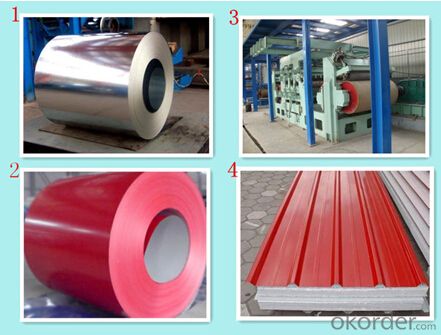
FAQ
1.What's your MOQ?
25MT, it is for one container.
2.Do you have QC teams?
Yeah, sure, our QC team is very important, they will keep the quality control for our products.
3. What's your normal delivery time?
Our delivery time about 10-20days for standard sizes, if you have other requirements like hardness and width ,it is about 20-40days. But don't worry ,we also try our best for the delivery time ,because time longer and our cost is higher.
4.Are the products tested before shipping?
Yes, all of our PPGI and GI was qualified before shipping. We test every batch every day.
- Q: How are steel coils used in the manufacturing of storage systems?
- Due to their durability, strength, and versatility, steel coils are an indispensable element in the production of storage systems. Typically made from high-quality steel, these coils are formed by rolling the steel into a coil shape. Within the manufacturing process of storage systems, steel coils serve multiple functions. Primarily, they are utilized in the construction of shelves, racks, and frames. These components offer the necessary structural support to hold and arrange items within the storage system. The robustness of the steel coils guarantees that the storage system can endure heavy loads and maintain stability over time. Furthermore, steel coils are employed in the fabrication of accessories for storage systems, such as brackets, hooks, and dividers. These accessories provide additional functionality and customization options, enabling users to optimize their storage space according to their specific requirements. Moreover, steel coils often serve as the material for doors and panels in storage systems. These coils are molded and shaped to create sturdy and secure doors that offer convenient access to the stored items while maintaining the overall integrity of the system. These doors can be designed with various locking mechanisms to enhance security and prevent unauthorized access. Additionally, steel coils are crucial in the production of mobile storage systems. These systems, such as mobile shelving units or compactors, are designed to maximize storage capacity in limited space. The flexibility and versatility of steel coils allow for the creation of movable components that can be easily adjusted and reconfigured to accommodate changing storage requirements. In summary, steel coils play a vital role in the manufacturing of storage systems, providing the necessary strength, durability, and versatility required for these structures. Whether utilized for shelves, accessories, doors, or mobile systems, steel coils ensure that storage systems are reliable, secure, and efficient in organizing and storing various items.
- Q: How much does a steel coil weigh?
- The weight of a steel coil can vary depending on its dimensions and thickness. However, on average, a steel coil can weigh anywhere between 2 to 20 tons.
- Q: How do steel coils contribute to corrosion resistance in products?
- Steel coils contribute to corrosion resistance in products through a combination of factors. Firstly, steel coils are often made from stainless steel, which contains a high amount of chromium. Chromium forms a protective oxide layer on the surface of the steel, known as a passive film, which acts as a barrier against corrosion. This passive film is self-healing, meaning that if it gets damaged or scratched, it can regenerate itself, ensuring continued protection against corrosion. Additionally, steel coils undergo a process called galvanization, where a layer of zinc is applied to the surface of the steel. This zinc layer acts as a sacrificial anode, meaning that it will corrode preferentially to the steel. This sacrificial corrosion protects the steel underneath, effectively preventing rust and other forms of corrosion from developing. Moreover, steel coils can be coated with various protective coatings, such as epoxy or polyurethane, to further enhance their corrosion resistance. These coatings provide an additional physical barrier that prevents moisture, chemicals, and other corrosive elements from reaching the steel surface. Lastly, steel coils can be manufactured with specific alloying elements, such as nickel or molybdenum, which further improve their resistance to corrosion. These alloying elements enhance the strength and durability of the steel, making it better able to withstand corrosive environments. Overall, steel coils contribute to corrosion resistance in products by utilizing stainless steel, galvanization, protective coatings, and alloying elements. By implementing these measures, steel coils ensure that products maintain their structural integrity and appearance over time, even in harsh and corrosive conditions.
- Q: How do steel coils compare to other materials like aluminum or copper?
- When comparing steel coils to other materials like aluminum or copper, it is evident that they possess both advantages and disadvantages. One primary advantage of steel coils lies in their remarkable strength and durability. Steel is renowned for its high tensile strength, enabling it to withstand heavy loads and high stress without any deformation. As a result, steel coils are highly suitable for various applications that demand robust and resilient materials, including construction, automotive manufacturing, and transportation industries. In contrast, aluminum and copper are generally softer and less strong than steel, rendering them less appropriate for heavy-duty tasks. Another advantage of steel coils is their cost-effectiveness. In comparison to aluminum or copper, steel is a relatively inexpensive material, making it a more accessible option for large-scale projects or mass production. Furthermore, steel is highly recyclable, contributing to its cost-effectiveness and sustainability. Nonetheless, steel coils do have some disadvantages when compared to aluminum or copper. One notable drawback is their weight. Steel is significantly denser than aluminum or copper, resulting in heavier steel coils that can be more challenging to handle and transport. This disadvantage can prove to be critical in industries where weight plays a vital role, such as aerospace or electrical applications. Additionally, steel coils are susceptible to corrosion, which is another disadvantage. While aluminum and copper possess natural corrosion resistance, steel is prone to rust and oxidation. Consequently, steel coils require proper protection and coating to prevent corrosion, which adds to the overall cost and maintenance requirements. In conclusion, steel coils offer exceptional strength, durability, and cost-effectiveness when compared to aluminum or copper. However, they are generally heavier and more prone to corrosion. Ultimately, the selection between steel, aluminum, or copper will depend on the specific application, budget, and project requirements.
- Q: How do steel coils contribute to the automotive manufacturing sector?
- Steel coils are essential in the automotive manufacturing sector as they are used to produce various components such as body parts, frames, and suspension systems. The high strength and durability of steel coils make them ideal for ensuring the safety and structural integrity of vehicles. Additionally, steel coils are easily moldable, allowing manufacturers to create complex shapes and designs, contributing to the overall aesthetics and functionality of automobiles.
- Q: What are the different types of steel coil surface finishes for aesthetics?
- There are several different types of steel coil surface finishes that are commonly used for aesthetics purposes. These finishes are applied to the surface of the steel coil to enhance its appearance and provide a desired aesthetic appeal. Some of the most popular types of steel coil surface finishes include: 1. Polished Finish: This type of finish involves using abrasive materials to create a smooth and reflective surface on the steel coil. It provides a high-gloss look and can be further enhanced by using different levels of polishing. 2. Satin Finish: Also known as brushed finish, this type of surface finish involves using a fine abrasive material to create a soft and matte appearance on the steel coil. It provides a subtle sheen and a textured effect. 3. Etched Finish: This finish involves using a chemical process to create patterns or designs on the surface of the steel coil. It can be used to create intricate and decorative designs, making it a popular choice for architectural applications. 4. Embossed Finish: This type of finish involves pressing or stamping a pattern onto the surface of the steel coil. It creates a raised design that adds texture and visual interest to the steel coil. 5. Powder Coated Finish: In this finish, a dry powder is applied to the steel coil and then heated to form a protective and decorative coating. It is available in a wide range of colors and provides a durable and vibrant finish. 6. Painted Finish: This type of finish involves applying a layer of paint to the surface of the steel coil. It allows for customization in terms of color and provides protection against corrosion and other environmental factors. These are just a few examples of the different types of steel coil surface finishes available for aesthetic purposes. Each finish offers a unique look and can be selected based on individual preferences and project requirements.
- Q: How long can steel coils be stored?
- Steel coils can be stored for an extended period if proper storage conditions are maintained. The duration of storage depends on factors such as coil quality, environmental conditions, and any specific storage requirements determined by the manufacturer.
- Q: How are steel coils used in the production of agricultural machinery parts?
- Steel coils are used in the production of agricultural machinery parts as they provide a durable and strong material for manufacturing components such as plow blades, tiller tines, and harvesting machine components. The steel coils are typically cut, shaped, and welded to create the necessary parts that can withstand the harsh conditions and heavy-duty operations involved in agricultural activities.
- Q: i want to know what is light gauge steel and the diffrences between light gauge steel and steel for roof truss.
- guage means thickness.
- Q: Can steel coils be used in outdoor applications?
- Indeed, outdoor applications can make use of steel coils. Steel, recognized for its resilience and robustness, proves to be ideal for various outdoor purposes. Commonly utilized in construction, automotive manufacturing, and transportation industries, steel coils exhibit resistance against adverse weather conditions like rain, snow, and UV exposure. Furthermore, to enhance their durability and prolong their lifespan, steel coils frequently undergo protective finishes such as galvanized or painted coatings. Ultimately, owing to their strength, durability, and ability to withstand environmental factors, steel coils emerge as a dependable and versatile choice for outdoor applications.
Send your message to us
Color Coated Steel Coil/Prepainted Steel Coil
- Loading Port:
- Tianjin
- Payment Terms:
- TT OR LC
- Min Order Qty:
- 25 m.t.
- Supply Capability:
- 10000 m.t./month
OKorder Service Pledge
OKorder Financial Service
Similar products
Hot products
Hot Searches
Related keywords
